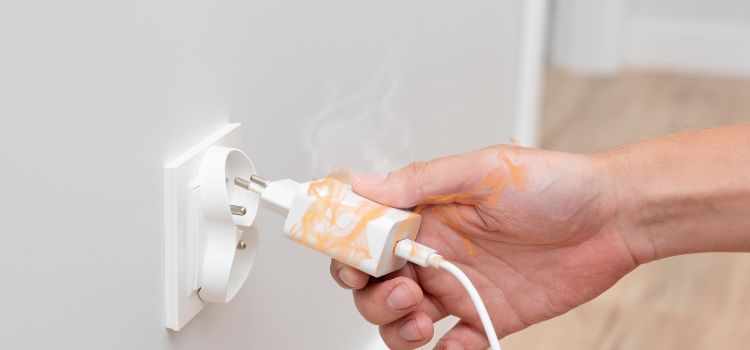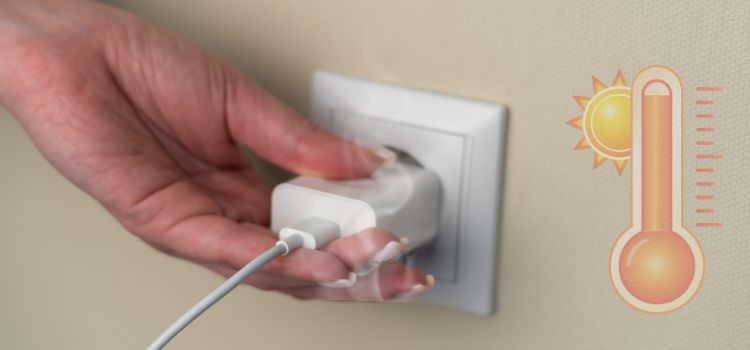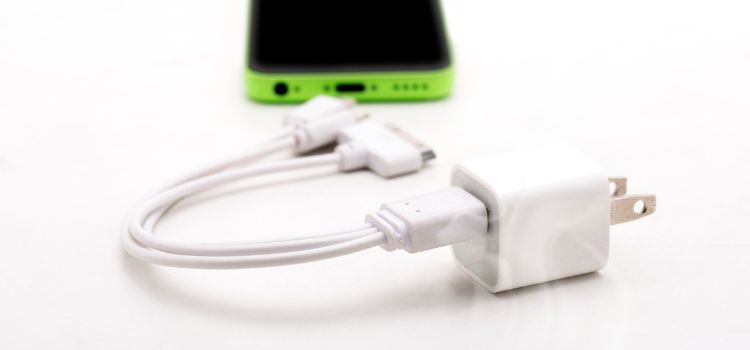As an Amazon Associate, I earn from qualifying purchases.
A common problem is that the phone charger is unusually hot. This can cause concern, prompting questions about safety and functionality. Smartphones are crucial in our everyday activities in the digital era. With constant use comes the necessity of keeping our devices charged and ready for action. This article delves into the reasons behind a hot phone charger, exploring technical aspects, potential risks, and preventive measures.
The Basics of Phone Charging
It’s essential to grasp how phone chargers work to understand why they get hot. A phone charger consists of a power adapter and a cable. The power adapter converts alternating current (AC) from the wall socket into direct current (DC) suitable for your phone. Because electrical components are inefficient, some energy is lost as heat during this conversion.
Reasons Why Your Phone Charger Gets Hot

1. Energy Conversion Inefficiency
Electronic devices could be more perfectly efficient. When converting AC to DC, energy loss occurs in the form of heat. This is a normal process, and a slight increase in temperature is expected. However, excessive heat may indicate a problem with the charger’s internal components.
2. High Power Demand
Modern smartphones have powerful processors and large batteries, requiring chargers to deliver more power. High wattage is forced into the charger using fast charging technologies like USB Power Delivery (USB-PD) and Qualcomm’s Quick Charge. This increased power transfer can generate more heat.
3. Extended Charging Periods
If you leave your phone plugged in for an extended time, especially after fully charging, the charger may overheat. This happens because the charger continues to draw a small amount of current to maintain the battery at 100%, generating heat over time.
4. Poor Quality Chargers
Using low-quality or counterfeit chargers can lead to overheating. These chargers often need proper safety mechanisms, use inferior materials, and need better energy efficiency, which can cause them to heat up excessively during use.
5. Environmental Factors
Ambient temperature can significantly impact the heat generated by a charger. Using a charger in a hot environment or placing it on surfaces that do not dissipate heat well, like beds or sofas, can lead to overheating.
6. Faulty Cables
Damaged or poor-quality cables can cause increased resistance, leading to higher current draw and heat generation. Using high-quality, certified cables is crucial to ensure efficient charging and minimal heat production.
7. Blockage of Ventilation
Chargers need adequate ventilation to dissipate heat. Blocking the charger’s ventilation slots or covering it with objects can trap heat, causing the charger to become hot.
8. Internal Short Circuits
Faulty components within the charger can lead to short circuits. This increases the heat and can pose a significant safety risk, potentially leading to fires.
Potential Risks of an Overheating Charger

1. Safety Hazards
Overheating chargers can pose serious safety risks, including electrical fires and burns. It’s crucial to address overheating issues promptly to prevent accidents.
2. Battery Damage
Excessive heat can damage your phone’s battery over time. Because they are heat-sensitive, lithium-ion batteries may only last for a short time or function well.
3. Reduced Charger Lifespan
Persistent overheating can degrade the charger’s internal components, reducing lifespan and efficiency. This could lead to a need for more frequent replacements.
4. Performance Issues
An overheating charger may not deliver consistent power, leading to slower charging times or interruptions in the charging process.
Preventive Measures and Solutions
1. Use Quality Chargers
Always use chargers from reputable brands or those provided by the phone manufacturer. Certified chargers meet safety standards and are designed to handle your device’s power requirements efficiently.
2. Avoid Extended Charging Periods
Unplug your phone once it has finished charging. Even if many contemporary phones and chargers have cutting-edge capabilities that reduce power consumption when the battery runs out, unplugging is still advised.
3. Keep Chargers Cool
Ensure your charger is well-ventilated and not covered by objects that could trap heat. Avoid charging your phone on beds, sofas, or other soft surfaces that can overheat.
4. Monitor Charging Environment
Be mindful of the ambient temperature. Avoid charging your phone in scorching environments. If necessary, use fans or air conditioning to keep the area cool.
5. Inspect Cables Regularly
Check your charging cables regularly for signs of wear and tear. Replace damaged or frayed cables immediately to ensure safe and efficient charging.
6. Update Software
Software updates can improve charging efficiency and heat management. Make sure your phone’s operating system is current.
7. Use a Surge Protector
Power surges can damage chargers and cause them to overheat. A surge protector, which offers steady electrical flow, can avoid this.
8. Avoid Using the Phone While Charging
Using your phone while charging can increase its power consumption, generating more heat. To keep temperatures down, it’s best to let it charge uninterrupted.
Troubleshooting an Overheating Charger

1. Check the Charger
Examine the charger for any noticeable wear or damage. If it seems damaged, replace it right away.
2. Test with Another Device
If the charger still gets hot, try using it with a different device. If it does, the charger is likely the issue. If not, the problem may lie with your phone.
3. Examine the Charging Port
Dirt or debris in the phone’s charging port can cause increased resistance and heat. Carefully clean the port with pressurized air or a soft brush.
4. Replace Components
If you think a cable might be the problem, consider using a different one. Similarly, testing with another power adapter can help isolate the problem.
5. Seek Professional Help
If the issue persists, it may be worth consulting with a professional technician or the phone’s manufacturer for further assistance.
Final Thoughts for Phone Charger Hot
While it is common for phone chargers to become warm during use, excessive heat is a sign of potential issues that need addressing. You can help ensure that your devices are charged safely and effectively by being aware of the reasons for charger overheating, identifying the dangers, and implementing preventive measures. Always prioritize safety by using high-quality charging equipment and staying vigilant about the condition of your chargers and cables. Feel free to seek expert help if issues continue to avoid any possible risks.
FAQs About Phone Charger Hot

Is it normal for my phone charger to get hot during use?
Yes, it is normal for phone chargers to get slightly warm during use. This happens because the energy conversion process from AC to DC inherently produces some heat. However, if the charger becomes excessively hot to the touch, it could indicate a problem that needs addressing.
Can a hot phone charger damage my phone or battery?
Yes, a hot phone charger can damage your phone or its battery. Excessive heat can harm lithium-ion batteries, reducing their lifespan and performance. It can also affect your phone’s internal components, leading to long-term damage. It is crucial to monitor and address any overheating issues promptly.
What should I do if my phone charger is overheating?
If your phone charger is overheating, take the following steps:
- Unplug the charger immediately to prevent any potential safety hazards.
- Inspect the charger and cable for visible damage. Replace them if necessary.
- Ensure proper ventilation around the charger and avoid using it on soft surfaces.
- Try a different charger or cable to see if the problem persists.
- If the issue continues, consult a professional technician or contact the phone’s manufacturer for further assistance.
Can using a charger different from the one provided with my phone cause it to overheat?
Using a different charger can cause overheating, especially if the charger is of poor quality or not certified for use with your specific phone model. Using the manufacturer’s charger or a reputable brand that meets safety standards is always best. High-quality, certified chargers are designed to handle your phone’s power requirements safely and efficiently.
Are there any long-term solutions to prevent my phone charger from overheating?
Yes, there are several long-term solutions to prevent your phone charger from overheating:
- Use high-quality, certified chargers and cables.
- Avoid charging your phone for extended periods, especially overnight.
- Keep the charging area cool and well-ventilated.
- Regularly inspect and replace damaged charging accessories.
- Stay updated with your phone’s software to ensure optimal charging efficiency.
- Avoid using the phone while charging to reduce power consumption and heat generation.
Adhering to these recommendations may reduce the possibility of your charger overheating and guarantee secure and effective charging for your devices.
Amazon and the Amazon logo are trademarks of Amazon.com, Inc, or its affiliates.